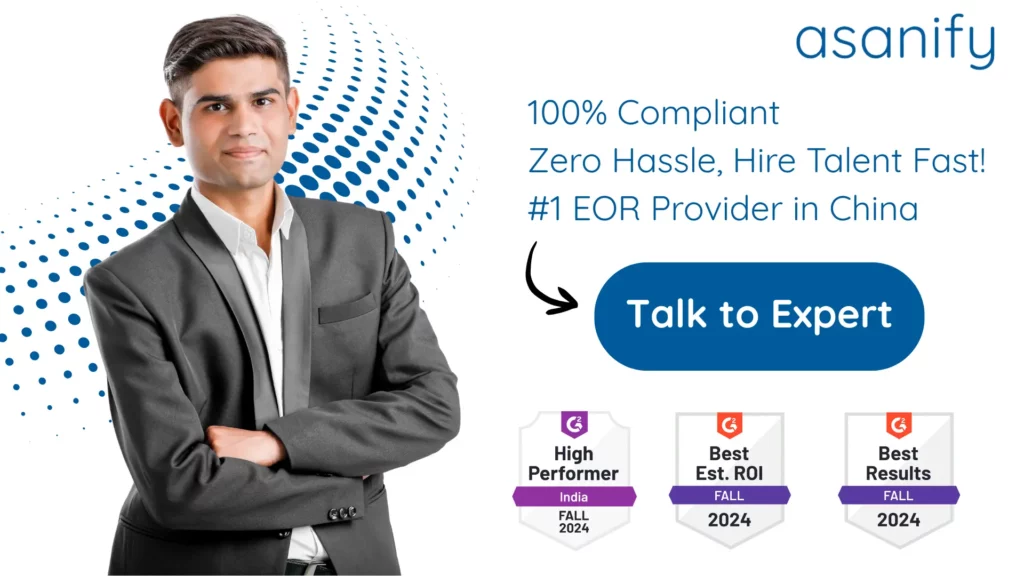In 2025, as global businesses double down on agile expansion strategies, staff augmentation continues to rise as a preferred hiring model. This approach offers companies the flexibility to access specialized talent, scale teams rapidly, and manage global operations without the overhead of establishing legal entities in every target market. One of the most strategic locations for staff augmentation today is China.
China offers an enormous pool of engineering, software development, manufacturing, and finance talent. Combined with a maturing legal framework, advanced digital infrastructure, and cost advantages, China presents an ideal environment for companies seeking to grow their presence in Asia. However, its complex regulatory landscape demands the right staffing partners to ensure success.
This guide explores the top 10 staff augmentation companies in China, explains key models, compliance considerations, and how global firms can scale efficiently in this high-potential market.
Table of Contents
- What is Staff Augmentation and Why is China a Strategic Destination?
- Staff Augmentation Models in China: How They Work
- Key Benefits and Challenges of Staff Augmentation in China
- How to Choose the Right Chinese Staff Augmentation Partner
- Top 10 Staff Augmentation Companies in China
- Compliance and Legal Factors to Consider in China
- How Asanify Can Support Your Hiring in China
- FAQs
What is Staff Augmentation and Why is China a Strategic Destination?
Staff augmentation allows companies to hire external professionals or teams who integrate into internal operations while being managed administratively by a vendor. These professionals remain under the client’s daily direction, allowing for greater control and alignment with company goals.
China is a strategic destination for staff augmentation due to its vast talent pool, competitive compensation levels, and rapid technological advancement. It is home to a growing number of highly skilled professionals in software engineering, AI, electronics, and fintech. The government’s continued investment in education, infrastructure, and technology parks makes it increasingly attractive to global employers.
Why Choose China for Staff Augmentation
- Massive talent pool across tech, finance, R&D, and engineering
- Lower labor costs compared to Western markets
- Mature IT outsourcing industry
- Expanding Tier 2 and Tier 3 cities offer niche skills at scale
- Improved IP and data protection legislation in recent years
Staff Augmentation Models in China: How They Work
China offers a broad range of staff augmentation models designed to accommodate the evolving needs of global enterprises, startups, and multinational corporations. Whether you’re launching a product, expanding your R&D operations, or scaling support teams, these models provide the flexibility to engage skilled professionals without the long-term liabilities of direct employment or the complexity of local entity setup.
Companies can select from several engagement structures, including fully onsite professionals, remote-first teams based in China, hybrid models, and contract-to-hire arrangements. These models can be deployed rapidly and are often managed by local staffing partners or Employers of Record (EOR) to ensure compliance with Chinese labor laws, payroll systems, and tax frameworks.
Key Engagement Options
- Onsite Talent Placement:
Professionals are placed directly at the client’s physical office in China. This is ideal for organizations with existing legal entities or partnerships in China, such as joint ventures, WFOEs (Wholly Foreign-Owned Enterprises), or those leveraging EOR platforms. Onsite models support close collaboration, client-side infrastructure usage, and high levels of oversight. - Remote Chinese Teams:
Chinese-based professionals work remotely from their homes or co-working spaces. These individuals are integrated into the client’s global workflows using collaboration tools like Slack, Jira, GitHub, and Zoom. This model is particularly attractive to companies without a local footprint in China, allowing them to access skilled talent without physical presence. - Blended/Hybrid Models:
Teams are structured with a mix of Chinese and offshore professionals. For example, a Chinese project manager might oversee offshore developers, or a team in China may be supplemented with engineers from Southeast Asia. This model balances cost, time zone coverage, and cultural alignment, offering more agility across global delivery centers. - Contract-to-Hire:
Candidates are initially engaged on a contractual basis, allowing the company to evaluate skills, cultural fit, and long-term potential before offering permanent employment. This reduces hiring risks, especially in markets like China where employment regulations are detailed and region-specific.
Types of Teams Commonly Hired in China
- Dedicated Software Engineering Pods:
Teams of backend, frontend, and full-stack developers working together under agile or scrum frameworks to support core product builds, feature rollouts, and platform migrations. - UI/UX Designers and Frontend Developers:
Design and implementation specialists focused on user experience, interface aesthetics, and front-end technologies like React, Vue.js, HTML/CSS, and mobile-first frameworks. - Quality Assurance and Testing Specialists:
Manual and automated QA testers who conduct functional, regression, localization, and security testing across web and mobile applications. - DevOps, Cloud, and Infrastructure Professionals:
Engineers with expertise in CI/CD pipelines, cloud infrastructure (AWS, Alibaba Cloud, Azure), network architecture, monitoring, and system reliability engineering.
These staffing models offer international companies a reliable, cost-effective, and flexible way to grow their operations in China, while maintaining legal compliance and seamless integration with global teams.

Key Benefits and Challenges of Staff Augmentation in China
Staff augmentation in China offers global companies access to a vast, cost-effective talent pool with strengths in engineering, software development, and emerging technologies. The country’s maturing vendor ecosystem, innovation hubs, and improving legal frameworks make it attractive for scalable team expansion. However, businesses must navigate complex local labor laws, IP protection concerns, and cultural or language differences. Partnering with a compliant local provider is essential to mitigate these challenges.
Benefits
1. Access to Scalable, Cost-Effective Talent
China offers a deep bench of skilled professionals at a fraction of the cost compared to Europe or North America. This includes developers, product managers, QA engineers, and analysts.
2. Strong Tech and Engineering Ecosystem
With growing innovation hubs like Shenzhen, Hangzhou, and Chengdu, China supports a thriving community of engineers and startup talent.
3. Round-the-Clock Global Collaboration
With remote teams in China, companies in North America and Europe can extend working hours and accelerate time-to-market.
4. Mature Vendor Ecosystem
China has well-established outsourcing and staffing agencies with experience in cross-border compliance, NDAs, and IP agreements.
5. Local Legal and Payroll Expertise
Experienced augmentation partners help you navigate China’s social insurance contributions, tax filings, and employment laws.
Challenges
1. Complex Regulatory Environment
China’s labor laws, tax regimes, and employment practices vary by city and province, requiring detailed local knowledge.
2. IP and Data Security Concerns
Although China has improved its data privacy frameworks, concerns around IP leakage remain a consideration for tech-driven companies.
3. Language and Cultural Barriers
While English fluency is improving, communication can still be a challenge, especially in Tier 2 cities.
4. Worker Classification Risks
Employers must ensure contractors are not functioning as de facto employees to avoid legal repercussions.
Suggested Read: Hire Remote Employees Onboarding Checklist with EOR in China
How to Choose the Right Chinese Staff Augmentation Partner
Selecting a reliable staffing partner in China is essential for success. A qualified partner should offer fast hiring, full legal compliance, and high-quality talent.
Evaluation Criteria
- Expertise in your industry (tech, finance, eCommerce, etc.)
- Canton- and city-specific labor law knowledge
- Proven experience with social insurance and tax compliance
- Speed of onboarding and deployment
- Availability of bilingual contracts and client support
Questions to Ask
- Do you provide compliant contracts and manage tax/social insurance contributions?
- Can you help us scale teams in multiple Chinese cities?
- How do you manage NDAs, IP, and confidentiality agreements?
- What is your average time to deploy talent?
- Can you support contract-to-hire or long-term staffing models?
Top 10 Staff Augmentation Companies in China
China hosts a dynamic mix of staffing agencies, IT service providers, and global talent platforms that offer compliant and scalable staff augmentation solutions. These top 10 companies help international businesses tap into China’s deep talent pool while managing local compliance, payroll, and onboarding complexities. Whether you need software engineers, QA testers, designers, or infrastructure experts, these providers offer flexible models tailored to your growth strategy.
1. Asanify
Asanify provides Employer of Record (EOR) and staff augmentation services across China, helping global companies hire developers, designers, analysts, and other professionals without setting up a local entity. It handles every aspect of employment compliance, including contract generation, tax filings, and payroll processing. Asanify also manages mandatory social security contributions such as pension, medical insurance, and housing fund. All employment agreements are bilingual and include NDAs and IP protection clauses aligned with Chinese law. With a fast onboarding process and localized HR support, Asanify enables efficient, risk-free team expansion across major Chinese cities.
Key Features:
- Local employment compliance across major cities
- China-specific payroll and tax filings
- Fast onboarding (5–10 business days)
- Bilingual contracts with NDA and IP clauses
- Supports hiring in 25+ countries
2. Pactera
Pactera is a well-established IT services company based in China, offering large-scale staff augmentation and outsourcing solutions. It specializes in software development, artificial intelligence, and data-driven projects. With a strong delivery infrastructure and global reach, Pactera supports enterprise clients across multiple industries.
Key Features:
- Scalable delivery teams for enterprise tech
- Based in Beijing with global offices
- Full regulatory compliance and contract support
3. ChinaSoft International
ChinaSoft delivers IT staffing and custom software development services, with a strong focus on the government, telecom, and financial sectors. It supports both remote and onsite talent placements across major Chinese cities. The company is known for its large talent network and compliance expertise in regulated industries.
Key Features:
- Onsite, remote, and hybrid staffing
- Extensive hiring coverage across Tier 1 and Tier 2 cities
- Legal and HR compliance for global clients
4. iSoftStone
iSoftStone offers digital transformation and IT consulting services with adaptable staff augmentation models. It provides skilled professionals in UI/UX design, software development, and quality assurance. The company supports both short-term projects and long-term team extensions for global clients.
Key Features:
- Technical and design talent across China
- Contract-to-hire and long-term models
- Supports MNCs in eCommerce, finance, and logistics

5. Infosys (China Division)
Infosys runs delivery centers across China, offering engineering and software staff augmentation services to international clients. It provides skilled teams for cloud, analytics, application development, and enterprise solutions. The company combines global delivery standards with local execution expertise.
Key Features:
- Global compliance standards with local execution
- Focus on cloud, analytics, and development roles
- Ideal for large-scale team extension
6. Beyondsoft
Beyondsoft is a prominent technology company in China that provides IT services, custom software development, and staff augmentation for global enterprises. It delivers remote and hybrid staffing models tailored to client needs, with a focus on compliance and scalability.
Key Features:
- Remote and hybrid delivery models
- Proven experience with Fortune 500 clients
- End-to-end compliance and onboarding support
7. HiSoft (merged with VanceInfo as Pactera)
HiSoft was one of the early leaders in China’s outsourcing industry and now operates under Pactera, offering full-service staff augmentation. It specializes in sourcing technical talent for telecom, banking, and R&D projects, backed by strong legal and compliance frameworks.
Key Features:
- Specialized in telecom, banking, and R&D staffing
- Legal support and confidentiality agreements
- Custom team sourcing
8. TechNode Talent
TechNode helps international startups and tech companies rapidly hire Chinese developers, designers, and product teams. It focuses on remote-first staffing models and is well-connected within China’s startup ecosystems, especially in cities like Beijing and Shanghai.
Key Features:
- Ideal for early-stage hiring
- Remote-first models with startup culture alignment
- Strong local network in Beijing and Shanghai
9. CIIC (China International Intellectech)
CIIC is a major HR and staffing provider in China, offering services such as payroll management, labor dispatch, and compliant staff augmentation. It supports foreign businesses across various industries with nationwide hiring coverage and strong regulatory expertise.
Key Features:
- Nationwide staffing coverage
- EOR and employment administration
- Legal compliance and payroll filing
10. Upwork Enterprise (China-enabled)
Upwork Enterprise, though based outside China, facilitates compliant hiring in China through partnerships with local legal and payroll providers. It enables companies to access remote talent while ensuring contracts, tax, and IP matters align with Chinese regulations.
Key Features:
- Access to remote global talent
- China payroll via local intermediaries
- Suitable for contract-based tech roles

Compliance and Legal Factors to Consider in China
Staff augmentation in China requires careful compliance with national and provincial labor laws. Companies must manage wage tax, social insurance (“Five Insurances and One Housing Fund”), and ensure that employment contracts are valid under local legal frameworks.
Key Considerations
- Proper worker classification to avoid misclassification penalties
- Tax filings with city-level bureaus
- Employment contracts must include compensation, scope, and duration
- Mandatory contributions to pension, medical, maternity, unemployment, and injury insurance
- Housing Fund contributions based on local rates
- Data privacy compliance under China’s Personal Information Protection Law (PIPL)
Suggested Read: Employer of Record China: A Comprehensive Guide on Employer of Record 2025
How Asanify Can Support Your Hiring in China
Asanify provides a comprehensive and fully compliant solution for global companies looking to hire and manage employees in China without the need to establish a local entity. Acting as your Employer of Record (EOR) providers or staff augmentation partner, Asanify simplifies the complex Chinese employment landscape—handling everything from contract generation and payroll processing to benefits administration and compliance monitoring.
With deep expertise in Chinese labor laws, social insurance obligations, and tax systems, Asanify ensures that your workforce is fully aligned with national and municipal regulations. Whether you’re building a development team in Shenzhen, hiring designers in Shanghai, or onboarding analysts in Beijing, Asanify offers a unified platform that enables fast, secure, and scalable team growth.
Key Capabilities
Chinese Payroll, Tax, and Social Security Administration
Asanify handles payroll processing, salary disbursements, and mandatory contributions for pension, medical, unemployment, maternity, injury insurance, and the housing fund. City-specific tax filings are submitted accurately and on time.
Bilingual Employment Contracts with NDA and IP Clauses
Contracts are provided in English and Mandarin, incorporating Chinese labor law requirements, salary terms, confidentiality agreements, and IP protection clauses.
Rapid Onboarding Within 5 to 10 Business Days
With automated workflows and vetted candidate pipelines, Asanify enables quick and efficient onboarding of Chinese professionals.
PIPL-Compliant Data Security Framework
Asanify adheres to the Personal Information Protection Law (PIPL), offering encrypted data storage, access control, and audit trails to protect sensitive information.
Centralized HR Dashboard
The platform offers a unified dashboard to manage documentation, leave, benefits, performance reviews, and offboarding—streamlining HR operations.
Multi-City Coverage Across China
Asanify supports hiring across major Chinese cities like Beijing, Shanghai, Shenzhen, Chengdu, and more, offering wide geographic reach.
Cross-Border Hiring in 25+ Countries
Beyond China, Asanify enables centralized management of international teams, ensuring legal compliance and consistent HR processes globally.
Whether you’re hiring one software developer or building a full remote tech team, Asanify ensures a legally secure, culturally sensitive, and operationally smooth hiring experience tailored to China’s unique market.
FAQs
Yes, through compliant contracts and licensed staffing or EOR providers.
No. You can hire through an Employer of Record like Asanify.
Common sectors include IT, manufacturing, eCommerce, logistics, AI, and fintech.
Worker misclassification, failure to contribute to social insurance, and IP non-compliance.
Yes, via contract-to-hire models supported by compliant vendors.
Yes, contributions are mandatory and vary by city.
Typically within 5 to 10 business days with the right partner.
Not to be considered as tax, legal, financial or HR advice. Regulations change over time so please consult a lawyer, accountant or Labour Law expert for specific guidance.



